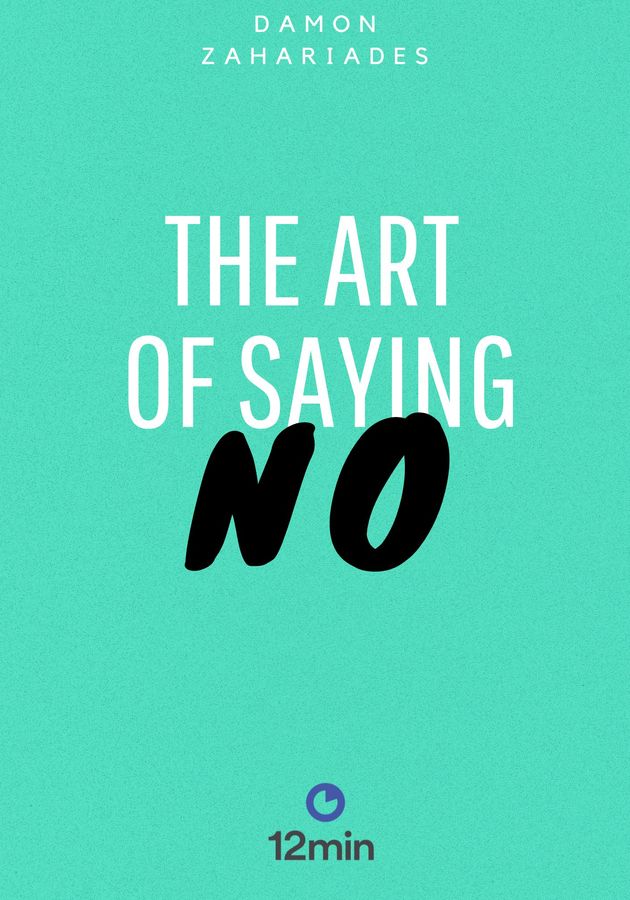Are you a nice person, always ready to lend a hand? Put otherwise, when someone requests your help, do you think things over or do you immediately set aside whatever you’re doing and say, ‘Sure! You can count on me!’”? If you are one of the latter, does abandoning your needs to cater to someone else’s makes you feel good? Or do you regularly feel unhappy, stressed, and exhausted as a result of constantly putting other people’s priorities ahead of your own? If so, Damon Zahariades’ book, “The Art of Saying No,” is for you. Get ready to learn how to finally curb your inclination to please people by saying ‘yes’ all the time!
The cost of being nice
“No” and “yes” may be two very short words, but their power is immense. Theoretically, they should be antonymous, but in reality, they are interconnected, and are just two different sides of the same coin. James Clear, the author of “Atomic Habits,” explained this best when he wrote the following: “When you say ‘no,’ you are only saying ‘no’ to one option. When you say ‘yes,’ you are saying ‘no’ to every other option. That’s why, ‘no’ is a decision, and ‘yes’ – a responsibility. So, be careful what (and who) you say ‘yes’ to. It will shape your day, your career, your family, your life.”
Indeed, as Warren Buffett has once remarked, “The difference between successful people and very successful people is that very successful people say ‘no’ to almost everything.” Put otherwise, mediocre people say “yes” and they say it to almost everyone. Hence, what they are actually saying is “no” – to themselves. At first glance, there’s nothing inherently bad in this. In fact, one might even say that putting other people before yourself might be the definition of taking the moral high road in life. But is it? Or, to rephrase the question, if it is, why does it make you feel unhappy and stressed all the time?
Obviously, there’s nothing bad in being there for friends, family – and even strangers. In fact, that’s great! However, this mustn’t come at the cost of abandoning your own priorities in the process. Because that will gradually drain you, while making you quite irritable as well. Why do you think flight attendants advise their passengers to put on their oxygen mask first before helping others do the same? It’s simple: if one helps others first, they risk succumbing to hypoxia – which would prevent them from helping anyone. Prioritizing your needs over the needs of others isn’t selfishness. Rather, it’s the first step toward becoming selfless.
The psychology of assertiveness
Mahatma Gandhi once remarked that “a ‘no’ uttered from the deepest conviction is better than a 'yes' merely uttered to please – or worse, to avoid trouble.” Indeed, that’s the real problem with most of your “yeses” – given the chance, you wouldn’t have uttered them at all. Meaning, you said them merely because you didn’t want to upset someone. So, you decided to upset yourself. “Saying yes is an ingrained habit for many of us,” writes Zahariades. “It’s something we learn to do over a long period of time. The longer we do it, the more entrenched the habit becomes until it’s instinctive. We do it on autopilot, agreeing to things before we even realize we’re doing so.”
The opposite of being a people pleaser isn’t being a disobedient or unhelpful person – it’s being assertive. Much like people-pleasing, assertiveness too is a learned skill. It’s deeply rooted in the important realization that if you don’t prioritize your life, someone else will. It involves telling people your point of view and not feeling as if you need their approval. Assertiveness is what leaves no room for confusion. “Being assertive means having the self-confidence to express your needs and wants, and pursue your own ends, even in the face of opposition,” explains Zahariades. “At its most basic form, it is candid communication. Nothing more.”
People often confuse assertiveness with aggressiveness, but the two are as different as sincerity and bluntness are. Whereas aggressiveness is belligerent and domineering by nature, assertiveness is respectful and compassionate. Whereas the former is a primitive impulse, the latter is “a planned, thoughtful, and considerate behavior.” Finally, whereas aggressiveness is repulsive because it reveals self-absorption, assertiveness is charming, because it manifests through grace. The art of saying “no” isn’t just about saying “no” – it’s about saying “no” without feeling guilty. And to achieve that, you must use a bit of grace. Otherwise, your “noes” will make you as unhappy as your “yeses.”
Reasons we struggle to say “no”
There are many reasons why you are saying “yes” when you know you should be saying “no.” Here are the most common five:
- You want to avoid offending people. People who are offended by hearing the word “no” are actually people with deep insecurities, because of which they internalize the “noes” as personal rejections. But that has nothing to do with you. As long as you are respectful to a requestor, you aren’t responsible for any offense taken.
- You want to avoid disappointing people. Disappointment comes from unmet expectations. Hence, it’s not your fault if by declining to help a requestor, you disappoint them. The fault lies with them, because they are the ones to have approached you with unrealistic expectations.
- You want to avoid seeming selfish. Why should it be selfish to prioritize your own needs more often than other people’s? After all, we have a limited number of days here on Earth. If you use up most of your time, energy, and attention on others, you won’t have enough left over for yourself. And you won’t get a second chance to fix this.
- You have a yearning desire to help others. Helping others is, of course, honorable. But keep in mind that you’re not responsible for solving everyone else’s problems. So, keep your altruistic feelings checked. Or, in the words of Zahariades, “Make sure that self-care has a higher priority than giving care.”
- You struggle with low self-esteem. If you’re struggling with low self-esteem, you mistakenly believe that your time is worth less than others’ time. In this case, the problem is the solution: by saying “no” more often, you’ll improve your sense of self-worth. In other words, the more you do it, the more you’ll be able to do it!
5 strategies for saying no (without feeling guilty)
As Zahariades says, “The biggest challenge you face when learning to say ‘no’ is overcoming the feelings of guilt, fear, and shame that surface when you disappoint people. That’s no small task. In many cases, it requires unraveling years of training.” Fortunately, there are several easy tactics that can help you curb your people-pleasing tendencies quickly and efficiently. Here are the first five:
- Be direct and straightforward. Don’t beat around the bush: when you decline requests, decline them clearly and candidly. Make sure to have a reason that leaves no room for confusion. So, don’t just say, “I don’t have time to help you.” Say, “I don’t have time to help you because I’m working on a crucial report that’s due in two hours.”
- Don’t stall for time. When you know the answer is “no,” pronounce it without “maybes.” Stalling is almost always a bad idea, because it makes you appear indecisive, it reduces your productivity by prolonging the situation and, worst, it strings the requestor along. Hesitation is insulting; a direct “no” shows respect.
- Replace “no” with another word. If the air of finality the word “no” carries seems too burdensome to you, then use another word or, even better, a phrase. Instead of saying, “No, I can’t help you,” say, for example, “I’d like to help you but people are depending on me to finish this project today.” That way, you’ll be turning down the request while defusing any potential confrontation with the requestor.
- Resist the urge to offer excuses. We already wrote that it’s important to have a reason for your “noes.” Be aware, however, that there’s a big difference between reasons and excuses. Unlike reasons which are final, excuses are provisional. Not only are they likely to make you feel guilty for misleading the requestor, but they also open the door to further negotiations. So, it’s always best to turn down the request with a simple “no” – and an honest, straightforward “because.”
- Take ownership of your decision. In most cases, it should be technically possible for you to help someone by surrendering your own time. That’s why saying “I can’t” is often so difficult: deep down, you know the other person knows it’s actually insincere. For this reason, when you don’t have a valid excuse to turn down someone, use a phrase the great American writer Herman Melville popularized in his brilliant short story, “Bartleby, the Scrivener”: “I would prefer not to.” It’s curt, it’s elegant, it’s respectful – and, above all, it communicates your needs, not your abilities.
5 more strategies for saying no (without feeling guilty)
As we already mentioned, saying “no” isn’t about refusing to help people, but about making the right decision with regards to your own health and wellbeing, given the immediate circumstances. And that’s what the following five strategies should help you with:
- Ask the requestor to follow up later. Asking the requestor to follow up later is a smart tactic to say “no” in the present if there’s a real possibility you might say “yes” tomorrow or the weekend after. The added benefit to using this tactic is that oftentimes the requestor may decide to complete their project without your help. Either way, it’s a win-win situation.
- Avoid lying about your availability. There’s a short story by Czech writer Milan Kundera in which the main character, a university professor, gets out of accommodating the request of an annoyingly insistent acquaintance by holding classes at a time different from his faculty hours. After a few months, he’s fired by the university because he’s never there when his hours say he should be. Lying will only get you thus far. When you say “no,” make sure to take ownership of it. Don’t say, “I can’t,” say “I don’t want to.”
- Offer an alternative. If possible, when you say “no,” give the requester another option. Example: “I want to help you but I don’t really have the time at the moment. Why don’t I ask John for you – he might be available and willing?” Remember, you don’t owe anyone any alternatives. However, by offering them, you’re showing the requestor that you care.
- Suggest another person who’s better qualified. Closely related to Strategy no. 8 is Strategy no. 9. Namely, you can refer a requestor to another person, not simply because they are more available or have more free time at the moment, but because they are more skilled than you in the particular area. This is a great way to help someone while declining their request for help.
- Describe your lack of bandwidth. If you’re truly busy, then the very best way to say “no” to a requestor is by showing them your schedule. Nothing makes a rejection more founded and less offending than the truth about your responsibilities. As Zahariades says, “Few requestors will try to negotiate with you or compel you to help once they understand what’s actually on your plate.”
Final notes
Truth be told, “The Art of Saying No” doesn’t share any new or revolutionary insights. However, a few books work better as instruction manuals for saying no. Combining personal experiences with practical and useful strategies, the book is a great step-by-step guide for setting boundaries and getting other people to respect them!
12min tip
Whenever you say “no,” say it directly and straightforwardly. Don’t stall for time and offer no excuses. Otherwise, at best, you’re actually saying “maybe”; at worst, you’re saying a prolonged “yes.”





























